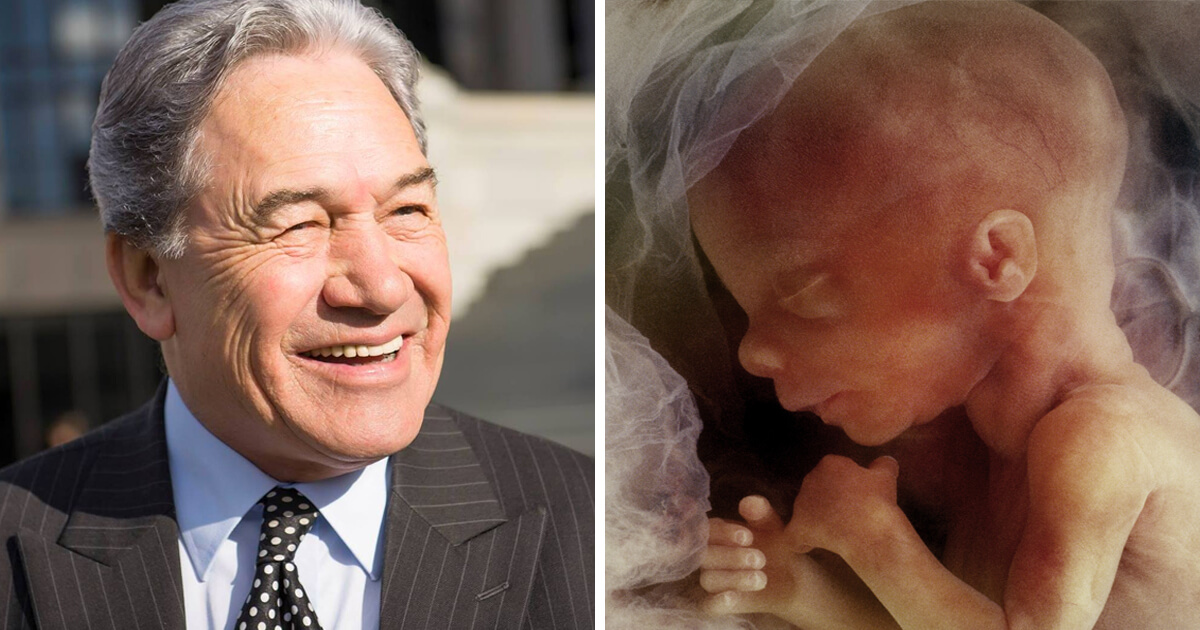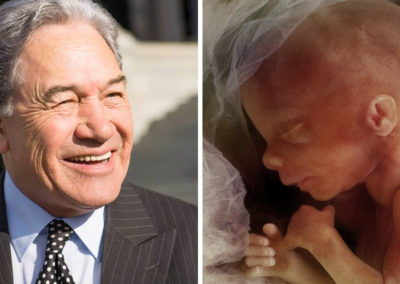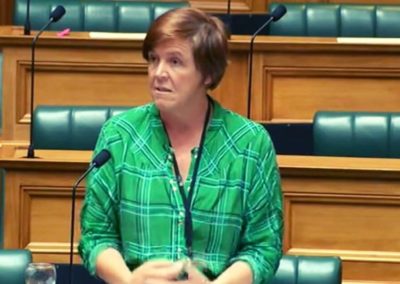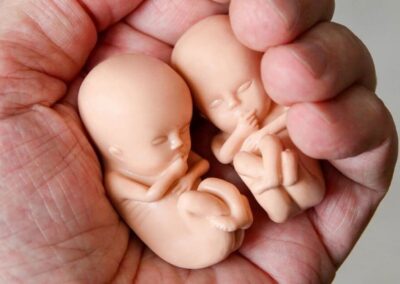New Zealand Deputy Prime Minister and leader of the New Zealand First Party, Winston Peters, who was elected on a ‘values’ and a pro-life vote in the last general election, has voted against an amendment requiring that pain relief be given to babies being aborted between 20-weeks and birth.
The amendment, tabled by Agnes Loheni MP, would have added a new requirement for abortion procedures post-20 week to ensure that a fetus does not feel pain, bringing the legislation in line with New Zealand’s Animal Welfare Act which requires vets to ensure that animals don’t feel pain.
Winston Peters also voted against 12 other amendments brought forward by pro-life MPs including amendments to:
- Require health professionals give medical help to babies born alive after ‘failed’ abortions
- Provide additional safeguards to help prevent sex-selective abortions
- Restricting abortions between 20 weeks and birth (to when a woman’s life or health is at risk – and requiring doctors to be involved with later abortions rather than the proposed requirement that any health professional can perform an abortion)
- Restricting abortions between 20-weeks and birth (to when there is a risk to the life, or of serious harm to the physical or mental health, of the woman; or the fetus is so medically impaired as to be unlikely to survive beyond birth)
- Keeping conscientious objection standards the same as they currently are (the bill currently weakens the protections)
- Restricting employment discrimination on grounds of conscience
- Require annual reporting of abortion statistics. Currently, the Bill only requires data collection during the first 18 months of the proposed abortion legislation coming into force
- Require health professionals to be culturally sensitive to those requesting an abortion and where necessary provide translation services
- Cultural considerations to be considered consistent with the Treaty of Waitangi (woman’s wellbeing protected by recognising her whakapapa and the whanaungatanga responsibilities of her family, whanau, hapu, iwi, and family group)
Over 12,000 people have now signed a petition calling on Winston Peters to withdraw the bill.
Ahead of the 2017 New Zealand election, Winston Peters cornered the ‘values’ and pro-life vote making it clear to voters that his New Zealand First Party would not ‘decriminalise’ abortion (introduce an extreme abortion law allowing abortion up to birth) and that they would support a change to the law to state that the unborn child has a right to life; to improve informed consent during the abortion process, and to implement parental notification for girls aged 15 and under seeking abortions. This reinforced a clear long-standing position which had been communicated to voters over a number of years.
Once in Government, Winston Peters has joined his coalition partner in bringing forward a bill to introduce the most extreme abortion legislation in the world – which would allow abortion de facto on demand, for any reason, up to birth – to the New Zealand Parliament.
This bill is very much his Government’s bill. He had his MP, Tracey Martin, work on co-writing the bill, along with the Justice Minister, over an eight-month period. Then his cabinet, in which he is the number two ranked minister, signed off on the bill.
Fetal pain
In a recent article, published in the influential Journal of Medical Ethics, two medical researchers, including a ‘pro-choice’ British pain expert who used to think there was no chance unborn babies could feel pain before 24-weeks, say there is now “good evidence” that the brain and nervous system, which start developing at 12 weeks’ gestation, are sufficient enough for the baby to feel pain.
They argue that women considering an abortion at this stage of pregnancy should be told about the pain their unborn baby could experience while being terminated.
Noting the increased concerns of women over the pain unborn babies may experience, they say medical staff should ask if the woman wants the baby to be given pain relief.
To carry on regardless of new evidence “flirts with moral recklessness,” they add.
Currently, the use of pain relief in the UK and New Zealand is not required by law or suggested in official guidelines. This in itself is contradicted by the standard NHS practice of giving painkillers to unborn babies receiving surgery in the womb for spina bifida.
The lead author of the article is British professor Stuart Derbyshire, who has acted as a consultant to the US’ largest abortion provider – Planned Parenthood – and the Pro-Choice Forum in the UK.
In 2006, he wrote in the British Medical Journal that not talking to women seeking abortions about pain experienced by unborn babies was “sound policy based on good evidence that foetuses cannot experience pain”.
However, due to recent studies, he says “it is now clear that the consensus is no longer tenable.”
Professor Derbyshire and Dr Bockmann advise: “Given the evidence that the foetus might be able to experience something like pain during later abortions, it seems reasonable that the clinical team and the pregnant woman are encouraged to consider foetal analgesia [pain relief].”
The two medics add that their own “stark differences” on the morality of abortion “should not interfere with discussion of whether foetal pain is possible”.
How Winston Peters and NZ First cornered the ‘values’ and pro-life vote
Winston Peters has carefully targeted the ‘values’ and pro-life vote over a long period of time leading up to the 2017 election. This included speaking at Family First’s high-profile Forum on the Family event along with consistently brandishing his pro-life credentials with ‘100% pro-life on abortion’ ratings in a number of leader questionnaires on life issues.
The results of these questionnaires have been circulated in Value Your Vote guides to tens of thousands of households across New Zealand and positioned his party as the one to elect for this part of the voting public.
In the 2017 Value Your Vote guide issued ahead of the 2017 election, Peters stated that he took the following position on abortion:
- Opposed the ‘decriminalisation’ of abortion (introduce an extreme abortion law allowing abortion up to birth).
- Supported a change in law to state that the unborn child has a right to life.
- Supported introducing abortion informed consent legislation, to improve the informed consent during the abortion process.
- Supported introducing abortion parental notification legislation, to implement parental notification for girls aged 15 and under seeking abortions.
He provided similar responses in earlier questionnaires which were published in previous guides going back a number of years, including a 100%/ ‘four smiles’ rating on abortion/pro-life issues in 2014.
This position was mirrored in a 2014 interview on stage at the high profile Forum on the Family election event where Winston Peters said:
- Life starts at conception.
- That he did not support decriminalising abortion (introducing an extreme abortion law to New Zealand).
- “Do you support the Green’s policy of ‘decriminalising’ abortion? No we don’t.”
- That he supported parental notification for a girl 15 years or younger to obtain an abortion.
This was reinforced by Tracey Martin, who represented Winston Peters and NZ First on stage at the 2017 Forum on the Family election event where Martin confirmed that the party supported keeping abortion in the Crimes Act (not ‘decriminalising’ abortion) and that the party supported introducing abortion parental notification legislation.
The pro-life and ‘values’ vote in New Zealand can have a significant impact for smaller parties that successfully corner it. In recent years, New Zealand First has positioned itself as the only electable party which has taken a clear moderate pro-life position, seeking to oppose ‘decriminalisation’ and introduce new incremental abortion restrictions. This was especially important to many voters ahead of the 2017 election as the Labour Party was pledging to ‘decriminalise’ abortion, and NZ First had made it clear to voters that they would not support ‘decriminalisation’ and wanted to see abortion laws further restricted.
There could be a big move of these voters post-election away from New Zealand First if Winston does not withdraw his bill.
Referendum amendment claims
Winston Peters has hidden behind claims that he will introduce a referendum amendment at Committee stage of the bill to give New Zealanders a say on whether this extreme bill becomes law.
This appears to have been a move to try and stop voters from leaving the party; the problem with this approach is that it will not be part of the core bill, and he does not have the support of sufficient numbers for it to pass.
If he was serious about letting the New Zealand public have a say on whether this bill becomes law, he would have insisted that his Government include a provision guaranteeing a referendum on this issue in the body of the original bill, but this was not included.
Polling from Curia research shows only 4% of the New Zealand population support introducing abortion up to birth. This is a bill designed to appeal to a tiny minority of abortion zealots, not the vast majority of sensible New Zealanders who find the idea of late-term abortions inhumane and barbaric.
Winston Peters’ Government is in control of the passage of this bill and has the power to withdraw the bill.
Right To Life UK is encouraging the public to sign a petition calling on Winston Peters to immediately withdraw his Government’s Abortion Legislation Bill – click here to sign the petition.
A number of NZ First voters who Right To Life UK have spoken to said they were outraged about Winston bringing forward the bill and stated that they would never be voting for his party again if he did not urgently get his Government to withdraw the Abortion Legislation Bill.












